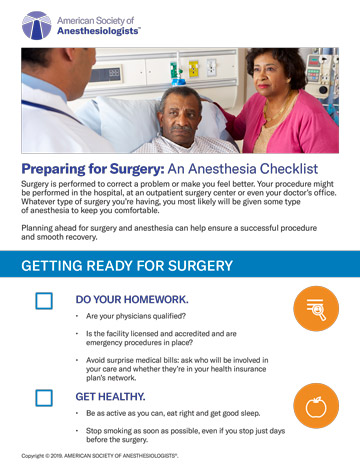Patients often neglect to share important health information with their anesthesia providers before surgery. They might not realize that taking ginkgo biloba for memory, using medical marijuana for pain, smoking and snoring are relevant, but these supplements, drugs and conditions are among the 8 things your nurses and anesthetists should ask patients before they wheel them back to the OR.
Stress to patients that you're not judging them, you simply need them to be honest about their health history so you can provide the safest, most effective anesthesia and pain relief. Let patients know that ensuring their safety is your priority and this information is essential. Be sure to ask patients if they:
1Take anything for their health, including:
- Medications. Many medications can affect anesthesia or pain management. Research shows a certain class of antidepressant can blunt the effects of some opioids. If patients take one of these antidepressants, the anesthetist may choose a different type of pain management. While patients should continue to take some medications (such as blood pressure medications) even during surgery, they may need to pause others for a day or longer. Be sure to ask about all of their medications and share that information with the anesthetist, who can then determine the best course of action.
- Supplements. Certain supplements can interact with anesthesia. Many people take ginkgo biloba to improve their memory or ginseng as an immune system booster, but both nutraceuticals can increase the risk of bleeding. Ask patients what supplements they take and the dosage. Ideally patients should bring their supplements to their presurgical appointment, or take a picture of the list of ingredients with their phones.
2Smoke. Let patients know that smoking damages the heart and lungs, and can lead to breathing problems during or after surgery. It also increases their risk of developing pneumonia, needing a ventilator to help them breathe after surgery, and suffering a heart attack during or after surgery. Smoking also reduces blood flow, which slows healing and increases the chance of infection. Let them know their anesthetist will likely ask them to stop smoking at least a week or more before the procedure. (And because they'll heal faster if they don't smoke while recovering, ask patients to kick the habit altogether.)
3Use marijuana. Marijuana has a sedative affect and can interact with anesthesia, so it's important to ask patients if they partake, whether by eating edibles, smoking or other methods. Further, smoking marijuana holds many of the same significant risks that smoking cigarettes does.
4Drink alcohol. More than 2 alcoholic drinks a day can increase patients' risk of side effects from anesthesia, as well as affect the amount of anesthesia they'll need. The anesthetist needs to know if they drink and may request that they abstain before surgery.
5Snore. If sleep apnea causes a patient's snoring, anesthesia is riskier because it slows breathing and increases sensitivity to side effects. Sleep apnea also can make it more difficult to regain consciousness after surgery. For sleep apnea patients, the anesthetist may adjust the sedative, keep them in recovery longer and prescribe non-opioid pain medications.
6Have had heat stroke or suffered a stroke. Ask patients if they or any of their family members have ever had heat stroke (a reaction to excessive heat when the body is unable to regulate its temperature) or suffered a stroke. Both can increase their risk of malignant hyperthermia, a severe and potentially deadly reaction to anesthesia that causes muscle rigidity and a sudden high fever.
7Have had a reaction to anesthesia. If patients have had a bad reaction to anesthesia during previous procedures, the anesthetist will ask detailed questions about what happened to adjust their anesthesia and prevent it from recurring.
8Have chronic health issues. Many chronic health conditions can have repercussions for anesthesia, including diabetes, heart disease, allergies, liver or kidney disease, asthma, high blood pressure, obesity, and seizures or other neurological disorders.
.svg?sfvrsn=be606e78_3)

.svg?sfvrsn=56b2f850_5)